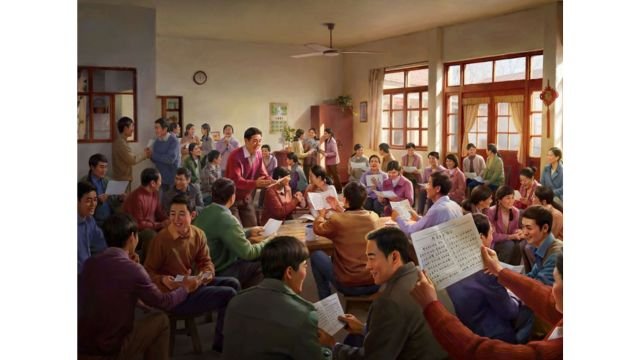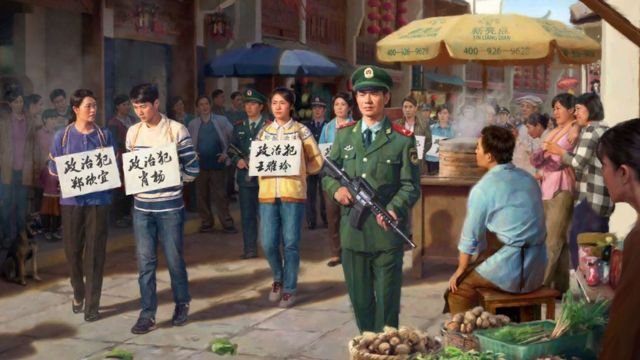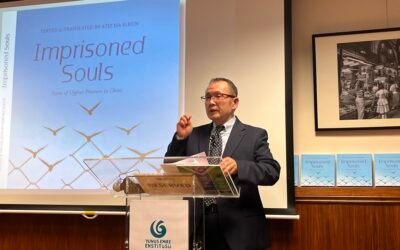Different narratives lead to different decisions. They should be examined one by one. We start with the existence of a religious persecution in China.
by Massimo Introvigne, James T. Richardson, and Rosita Šorytė
Article 2 of 9. Read article 1.

The table below offers a summary of the main issues discussed in the decisions. Very few decisions, if any, discuss all of them. Particularly in the negative cases, only one of the reasons for denying asylum listed in the table may be regarded as sufficient to reject the application.
Summary of the arguments
| Reasons for granting asylum | Reasons for denying asylum |
| 1. Religion persecution is widespread in China. | 1. That religion is persecuted in China is not true, or grossly exaggerated by the U.S. and their allies for political reasons. The applicant claims to be a Christian, and Christianity is not illegal in China. |
| 2. Under Article 300 of the Chinese Criminal Code those active in a movement labeled a xie jiao are prosecuted and sent to jail. | 2. Article 300 of the Chinese Criminal Code deals with xie jiao, but specifies that only xie jiao members who committed crimes are prosecuted. |
| 3. Under article 300 common members, not only leaders of the CAG, are prosecuted and sentenced. | 3. Under Article 300 only CAG leaders, rather than common members, are prosecuted and sentenced. |
| 4. The CAG is listed as a xie jiao, and is prosecuted as such, independently of its alleged acts of violence (which are largely CCP-spread fake news). | 4. The CAG is listed as a xie jiao because of its secrecy and criminal activities, which would be prosecuted in any country. |
| 5. The applicant proved to be a CAG member; the statements by CAG leaders in the diaspora attesting to this are believable. | 5. There is no evidence that the applicant is a CAG member; statements by CAG diaspora leaders are stereotyped and generally not believable. |
| 6. Although perhaps with inconsistencies in matters of detail, the story told by the applicant is generally believable. | 6. There were contradictions and details missing in the applicant’s story, which shows s/he did not tell the truth. |
| 7. Statements referring to the person worshiped by the CAG as Almighty God as “he” (while knowing is a woman) and stating that the applicant does not know/does not want to say the civil name of the person s/he worships as Almighty God are typical of genuine CAG members. | 7. The applicant does not know what s/he claims to be her/his religion. In particular, s/he refers to Almighty God as “he” (while we know the person the CAG worships as Almighty God is a woman), and claims s/he does not know (or would not mention) the civil name of the person worshiped as Almighty God. |
| 8. If the applicant reports that s/he has been converted by a family member, this is also believable and indeed fairly typical. | 8. Since the CAG is “against the family,” if the applicant reported s/he was converted by a close relative, this proves her/his story is not believable. |
| 9. Credible fear of persecution is compatible with the fact that the applicant obtained a passport and was not stopped at customs, by either (a) taking advantage of loopholes in the Chinese system; or (b) bribing the relevant officers. | 9. If the applicant had really been persecuted, obtaining a passport and pass customs would have been impossible. The Chinese data base PoliceNet and facial recognition at customs are comprehensive and virtually infallible, and in case of serious crimes, such as those connected with the xie jiao, that police can be corrupted is not believable. |
| 10. Chinese authorities spy on CAG communities abroad. Irrespective of whether the applicant converted in China or sur place, abroad if s/he appeared in CAG events or publicly available videos, or has applied for asylum, most probably the Chinese authorities have by now identified her/him as a CAG member, and as such s/he will be arrested in case of returning to China. | 10. There is no evidence, except the subjective perception of the applicant and biased anti-Chinese sources, that China keeps CAG and other dissidents abroad under surveillance. |
In this and the following installments of this series, we will examine the ten issues one by one.
The first question discussed in the decisions is whether religious persecution in general exists in China. The answer should be obvious, and it is regarded as such in a large majority of decisions. Some quote, either directly or from COI that mention it, the distinction proposed by sociologist Yang Fenggang about three “markets” of religions in China: the “red market,” including the religious organizations approved and controlled by the government, such as the Three-Self Church for non-Catholic Christians; the “grey market” of the house churches and the independent temples and mosques, theoretically illegal but more or less tolerated, at least before Xi Jinping; and the “black market” of the xie jiao. The grey and even the red markets now suffer severe limitations too, but there is little doubt that the groups in the black market are persecuted.
A small number of court decisions, some of them in Italy and France, pick up a fight with most government-produced COI and scholarly studies of religion in China, and rely on information packages on “religious liberty” in China circulated by Chinese embassies, to claim that, if only they agree to respect the general laws, all religions are free to operate in China. This is obviously false, and such decisions go one step further and note that most COI published by governments are influenced by the United States, which have their own anti-Chinese agenda. As for scholars, particularly those who specialize in new religious movements are dismissed as “cult apologists,” based on standard anti-cult criticism, as happened in a French National Court for the Right of Asylum’s decision of August 28, 2019 (interestingly, signed by a judge who had been previously active in the French anti-cult movement).

The two arguments are connected. Two of us (Introvigne and Šorytė) serve respectively as editor-in-chief and deputy editor of “Bitter Winter,” which is often quoted in the most recent COI, and is a main source of the sections of China of the U.S. Department of State yearly reports. While this led several courts to quote in turn from “Bitter Winter” as a reliable source, those few judges who believed that the U.S. have a vested interested in depicting a dark but untrue picture of religious liberty in China countered that the Department of State spread information taken from a biased anti-Chinese magazine.
As mentioned earlier, these decisions are rare. However, lawyers we interviewed told us that “information packages” supplied by Chinese embassies play an important role in several countries, including Japan, where no CAG asylum applications have been accepted to date, and South Korea, where only one application has been accepted, in 2021.
Particularly in some early decisions, problems were also created by interviews where some CAG applicants kept referring to themselves simply as “Christians” rather than as “members of The Church of Almighty God.” In fact, this is a common internal jargon of CAG devotees, who often simply call each other “Christian,” but was, and to some extent remain, likely to create confusion with authorities not familiar with the CAG, who may object that Christianity per se is not persecuted in China. In some decisions, after the applicant had claimed to be “a Christian,” questions were asked about Christian doctrines not shared by the CAG. In one case in France, the applicant was asked to mention the names of the twelve Christian apostles, a question most Christians would also be unable to answer too. In reviewing an interview featuring the same question, the Administrative Court of Freiburg on February 13, 2020 noted that, by being able to mention “immediately” four out of the twelve apostles, the CAG refugee had proved to be better informed on Christianity than the average German citizen.
It should also be considered that further problems are added by the translation process (administrative authorities often employ underpaid and sometimes not very skilled translators), and by the fact that immigration commissions in several countries include police and border officers who are not necessarily familiar with religion.

Massimo Introvigne (born June 14, 1955 in Rome) is an Italian sociologist of religions. He is the founder and managing director of the Center for Studies on New Religions (CESNUR), an international network of scholars who study new religious movements. Introvigne is the author of some 70 books and more than 100 articles in the field of sociology of religion. He was the main author of the Enciclopedia delle religioni in Italia (Encyclopedia of Religions in Italy). He is a member of the editorial board for the Interdisciplinary Journal of Research on Religion and of the executive board of University of California Press’ Nova Religio. From January 5 to December 31, 2011, he has served as the “Representative on combating racism, xenophobia and discrimination, with a special focus on discrimination against Christians and members of other religions” of the Organization for Security and Co-operation in Europe (OSCE). From 2012 to 2015 he served as chairperson of the Observatory of Religious Liberty, instituted by the Italian Ministry of Foreign Affairs in order to monitor problems of religious liberty on a worldwide scale.



